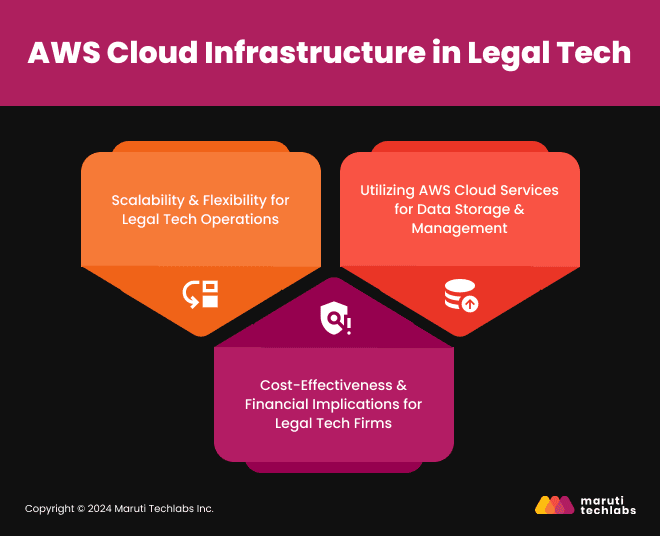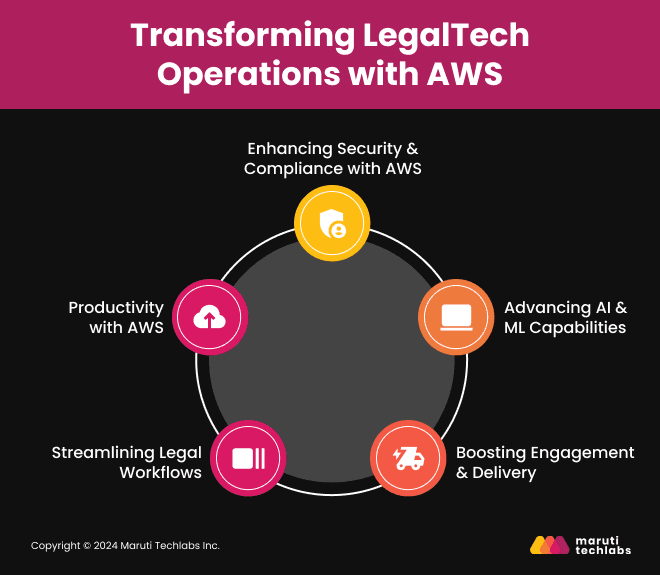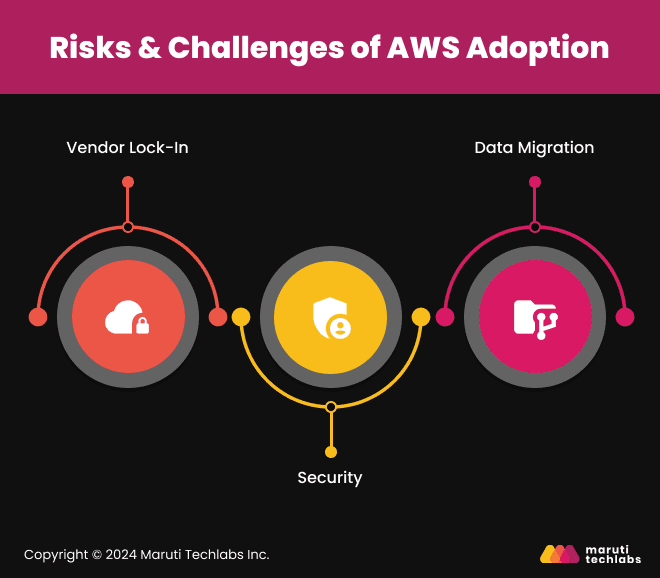

How Legal Tech Companies are Transforming Operations with AWS






As a legal professional, you are not new to the challenges of managing complicated workflows, maintaining data security, and satisfying customers’ ever-increasing expectations. To remain competitive, embracing technology that makes these activities easier is critical.
AWS (Amazon Web Services) provides effective tools for legal tech firms to improve their productivity. It offers safe and versatile solutions for data storage, application execution, and script execution without requiring a physical server. AWS can be relied on as a cloud computing platform for legal teams that need data security measures, optimized work processes, and efficient collaboration.
For instance, Amazon has its AWS Identity and Access Management (IAM), which guarantees that some important files can only be accessed by certain parties. This enables legal firms to reduce their costs, spend less time on their work, and simply give their clients the best service.
In this blog, we’ll dive into how AWS is reshaping legal operations, helping legal tech companies save time and money, and boosting overall productivity.
Legal tech companies must stay agile and efficient in a fast-paced industry, and cloud infrastructure is essential for achieving that. AWS provides the flexibility and power necessary to scale operations, handle fluctuating workloads, and stay ahead of the competition.

Here’s how AWS is transforming legal operations.
AWS allows legal tech companies to scale quickly and cost-effectively without major upfront investments. For example, during a large litigation case or a major contract review, AWS can handle unexpected spikes in data traffic and storage requirements.
Using services like Amazon EC2, firms can instantly scale their computing power to manage increased workloads, ensuring continuous performance during high-demand periods.
Smaller legal firms can greatly benefit from AWS’s scalability, especially when dealing with seasonal surges in case volume. Instead of purchasing expensive hardware, legal professionals can adjust their resources on demand, ensuring cost efficiency while maintaining top performance.
Legal tech companies often deal with vast amounts of sensitive data. To meet these needs, AWS offers reliable, secure storage solutions like Amazon S3, AWS RDS, and DynamoDB. These services help law firms manage and protect client data while ensuring fast access when needed.
For instance, case data and client information can be stored in Amazon RDS as a relational database and can be easily queried. AWS offers data protection capabilities in compliance-heavy fields such as legal services, including encryption and backup. Furthermore, features such as redundancy considerably lower the likelihood of data loss.
The pay-as-you-go pricing model offered by AWS is especially beneficial for legal tech organizations, particularly startups. Instead of having organizations sink major investments in physical capital, they directly purchase resources for use within the firm.
This helps them to grow the business as and when they desire, with less worry about the actual cost of investment.
For instance, a legal tech startup can start with a small AWS package, using only the storage and computing power it needs. As the business grows, it can seamlessly scale its resources, ensuring that costs stay under control while meeting increasing demands.
Having established how AWS affords scalability, flexibility, and affordable solutions, it is crucial to mention the following strategies for enhancing the effectiveness of those resources in legal technology firms.
AWS is at the forefront of this transformation, helping legal tech companies streamline operations, enhance security, and offer innovative services. Discover how AWS is driving the change in legal operations:

Security is crucial in legal technology since dealing with sensitive client information is a daily affair. With AWS, you can safely handle sensitive data with robust capabilities like AWS Identity and Access Management (IAM), encryption methods, and Virtual Private Cloud. These services ensure that confidential information is only accessed by authorized personnel, providing security that reduces the likelihood of breaches.
Beyond security, AWS will help legal tech companies meet specific industry compliance needs. Whether it is health-related HIPAA or EU citizens whose data is under GDPR, the suite of compliance tools ensures that the firm complies with standards.
Legal tech firms are embracing AI and machine learning to revolutionize their operations. By automating tasks that once took hours, these technologies help businesses work more efficiently, reduce errors, and ultimately deliver better results for their clients.
Legal experts use Amazon Comprehend to automate the time-consuming task of evaluating vast numbers of documents. This program retrieves important information from contracts, litigation documents, and case files, ultimately conserving your time.
Let’s say a legal tech startup uses Amazon Comprehend to analyze and extract key information from thousands of contracts automatically. This saves the team from manual work, allowing them to focus on important tasks, like negotiating contract terms or advising clients on legal strategies.
Client communication is another area where legal tech firms are seeing major improvements. With Amazon Lex, firms can easily build intelligent chatbots that handle common client inquiries, reducing the need for human interaction. This not only speeds up response times but also enhances client satisfaction by providing quick, reliable answers 24/7.
Moreover, AWS’s machine-learning tools are revolutionizing contract analysis and legal research. Firms can automate these processes, drastically reducing the time spent reviewing contracts or searching for relevant case law.
Client engagement is important for the success of any legal firm. AWS provides powerful tools to enhance how legal professionals interact with their clients. With AWS’s chatbots, self-service portals, and personalized experiences, firms can streamline communication and improve service delivery.
AWS’s Amazon Lex enables legal firms to create intelligent chatbots that instantly answer common client questions. This lets clients get quick, accurate responses without waiting for a human agent.
Personalized experiences such as customized communication and self-service portals can significantly improve client satisfaction and build stronger relationships.
Legal firms often spend a lot of time on manual tasks, such as document processing and workflow management. These tasks can be tedious and error-prone, taking time away from more important work. AWS helps legal tech companies automate these routines, freeing staff to focus on higher-value tasks.
AWS offers a range of tools designed to optimize daily operations. For instance, Amazon Textract automates the extraction of text and data from scanned documents. Instead of spending hours entering data manually, legal teams can use Textract to quickly process large volumes of documents with high accuracy, freeing up resources for tasks that require legal expertise.
Additionally, AWS’s workflow automation tools help streamline tasks across multiple departments. From automating scheduling to routing documents and handling client communications, AWS tools reduce manual effort and accelerate processes. Legal professionals can rely on these solutions to boost productivity, reduce turnaround times, and ensure consistency across their firms.
Legal experts use Amazon Comprehend to automate the time-consuming task of evaluating vast numbers of documents. This program retrieves important information from contracts, litigation documents, and case files, ultimately conserving your time. While AWS offers remarkable advantages for legal tech firms, adopting cloud infrastructure comes with its own set of challenges.
Adopting AWS has enormous opportunities for legal technology enterprises, but it also raises a number of problems. Addressing these constraints, which range from data transfer challenges to the requirement for specialized expertise, is critical to a successful AWS installation.
Legal tech companies may face several risks when adopting AWS. The primary concerns include vendor lock-in, security risks, and data migration challenges.

Firms can reduce these risks by conducting thorough assessments before migration, using hybrid cloud models, and utilizing AWS’s security features, such as encryption and multi-factor authentication.
Another major challenge is the skill deficiency in cloud technology. A company is still limited by the skills of its own employees. The lack of AWS specialists inside a company can slow down cloud migration or reduce the potential of using AWS to the maximum.
To address this gap, firms can:
With proper training and external support, legal tech firms can unlock AWS's full potential to streamline their operations.
Before using AWS, firms need to determine the value they are willing to receive in exchange for adopting it, known as the ROI. AWS has the added advantages of scale and flexibility; however, performance measurements, such as cost per transaction, resource usage, and operational cost savings, must be monitored, or the platform will not provide value.
Businesses should also think about their long-term, strategic investments in AWS. Despite AWS’s pay-as-you-go service, it is crucial to budget for upcoming costs because they mount up as the organization’s consumption grows.
As new technologies like quantum computing, AI, and blockchain continue to mature, legal professionals will gain access to powerful tools that can transform how they operate.
AWS offers cutting-edge tools to help legal professionals streamline work and gain valuable insights. Two key technologies, Quantum Computing and Machine Learning, are set to drive major changes in the industry.
Quantum computing is still in its early stages, but it promises to revolutionize how legal professionals handle large volumes of data. AWS’s Amazon Bracket offers a way for legal tech firms to explore quantum computing resources. As the technology matures, it will speed up tasks like analyzing complex legal cases and predicting outcomes in real-time.
AWS continues to advance machine learning tools like Amazon SageMaker and Amazon Comprehend. These tools are becoming smarter, faster, and more accurate. In the future, they will automate document review and data extraction, support complex decision-making, and help predict the best legal strategies for case management.
With future advancements in AWS tools, legal tech companies will be able to automate even more areas of legal operations. For example, AWS could help streamline legal compliance by automatically tracking regulatory changes and ensuring firms are up to date. Additionally, case management will be further optimized, allowing legal professionals to manage cases more efficiently.
Blockchain technology is poised to transform the legal sector by enabling secure, transparent contracts. AWS’s blockchain services will allow legal firms to create smart contracts that automatically execute when conditions are met, reducing the need for intermediaries and speeding up legal processes.
The legal tech industry is moving fast, and firms that want to stay ahead must proactively integrate new technologies. By adopting cloud-native solutions like AWS, legal professionals can stay agile and ready for whatever comes next. Whether AI, blockchain, or quantum computing, AWS provides the infrastructure to support these emerging tools and help firms remain competitive.
As these technologies evolve, legal professionals need to stay current with the latest AWS tools. Ongoing training and certification programs will be essential for firms looking to integrate new technology and stay competitive in the future.
AWS offers legal tech companies a host of benefits, from scalability and security to advanced AI tools like Amazon Textract and Amazon Lex. These solutions automate workflows, enhance client communication, and improve overall efficiency, making it easier for legal professionals to focus on high-value tasks.
As future technologies such as quantum computing and machine learning grow, AWS will allow legal tech firms to remain at the forefront of innovation. These tools have the ability to transform legal research, case management, and decision-making, allowing firms to remain competitive and future-ready.
At Maruti TechLabs, we help legal tech companies harness the power of AWS to optimize workflows, automate processes, and drive growth. Our expertise ensures that your firm stays ahead of the curve, employing the latest technologies to boost productivity and enhance service delivery. Get in touch with us today to explore how we can help you integrate AWS solutions into your legal operations for a smarter, more efficient future.
Scalability, improved security, and the capacity to automate routine procedures are just a few of the many benefits that AWS provides to legal tech companies. Businesses may increase customer engagement, optimize workflows, and improve document management with solutions like Amazon Textract and Amazon Lex. Better client happiness, quicker turnaround times, and increased efficiency are the outcomes of this.
AWS offers a collection of solutions meant to automate laborious processes like case management and document processing. Our customized AWS services can help your company focus on higher-value tasks that propel growth while streamlining operations and minimizing human error.
Yes, AWS prioritizes security and compliance. It helps law firms comply with industry rules by providing features like data encryption, multi-factor authentication, and compliance certifications. While AWS’s scalable solutions facilitate quicker adaptation to changing compliance standards, its cloud infrastructure guarantees the security of your data.
AWS’s cutting-edge AI and machine learning technologies, such as Amazon Comprehend and Amazon Lex, increase accuracy, reduce time, and improve decision-making. These tools automate processes like client communications, legal research, and document review, enabling legal practitioners to provide more effective and strategic services.
Supplemented with the concepts of quantum computing, legal tech has the opportunity to change the speed of processing large amounts of information. Over time, AWS’s Amazon Bracket would enable legal tech firms to consider quantum references, cutting the turnaround time across case analysis and outcome prognosis for optimal decision-making and operations.


